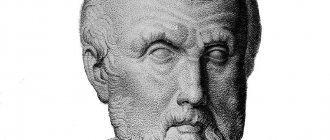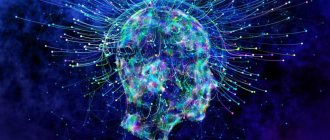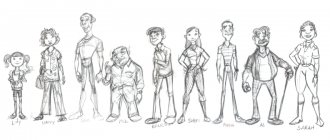Character (from the Greek charakter - seal, embossing, distinctive feature, sign, omen, peculiarity. The concept of “character” means the totality of individual mental properties that develop in activity and are manifested in methods of activity and forms of behavior typical for a given person.
Character is an individual combination of stable mental characteristics of a person that determine a typical way of behavior for a given subject in certain life conditions and circumstances.
Character is an established system of stable mental characteristics that express a person’s different attitudes towards reality and himself.
Character is a set of stable personality traits that determine a person’s attitude towards people and the work they do. Character is manifested in activity and communication (like temperament) and includes what gives a person’s behavior a specific, characteristic shade (hence the name “character”).
Character expresses the most typical essential features of a person, knowledge of which allows one to predict how a person will act in certain situations.
Character reveals dependence on worldview, beliefs and moral principles, revealing its socio-historical nature.
What is character
This concept itself appeared in the era of Antiquity and comes from the Greek word “imprint”. Indeed, character manifests itself in a person’s behavior and leaves an imprint on him, making him unique and recognizable. And the stronger the character, the more vivid and unique the results of the individual’s activities are. But a person who is deprived of this power, that is, that inner “I” that controls behavior, is often called characterless. Not in the sense that he has no character, but because his actions are determined by external circumstances, and not by internal beliefs and moral qualities.
Character is a complex system of personality traits and qualities, so their combination and degree of expressiveness make each person unique. The character traits that make up its structure are usually divided into two large groups:
- biologically given (innate);
- formed in the process of personality development (acquired).
Concept of personality
Definition 1
Personality is a concept that reflects the social nature of a person for studying him as a subject, as a bearer of individual consciousness, etc.
In the context of psychology, a personality is an individual who acts as a subject of relations in society, as well as as a subject in his own conscious activity.
Personality also means a system of properties of an individual, which manifests itself in human activity.
According to R. Cattell, personality is a concept that characterizes a person’s behavior in a given situation. G. Allport believes that “a personality is something, and it does something.
Personality is what lies behind specific actions within the individual himself.”
Are you an expert in this subject area? We invite you to become the author of the Directory Working Conditions
Biological basis of character structure
The basis of character is the innate characteristics of higher nervous activity:
- speed of nervous processes;
- the strength of these processes;
- the ratio of excitation and inhibition in the nervous system.
The combination of these features constitutes the temperament or type of higher nervous activity of a person. There are only 4 types of temperament (phlegmatic, melancholic, sanguine and choleric), but in their pure form they are practically never found. These are complexes of traits, features of higher nervous activity that are present in humans in different combinations and varying degrees of severity. That is, if we take, for example, such a paired characteristic as introversion-extroversion, then a person can be more or less an extrovert or an introvert.
And there are several such characteristics that make up temperament. For example:
- rigidity and plasticity;
- emotional stability and emotional imbalance, sensitivity (sensitiveness), etc.
Due to their combination, a unique biological basis for character is created, and in the process of its formation, innate individual psychological traits are melted under the influence of the environment, mixed with social qualities, acquired properties, characteristics, and a completely unique personality is created.
Bibliography
1. Vygotsky L.S. Pedagogical psychology. – L., 1983.
2. Enikeev M.I. General and legal psychology (in two parts). Part I “General psychology”. Textbook. – M.: Legal. lit., 1996.
3. Kovalev A.G., Myasishchev V.N. Psychological characteristics of a person. T. 1. Character. – L., Leningrad State University Publishing House, 1958.
4. Brief psychological dictionary / Ed. A.V. Petrovsky and M.G. Yaroshevsky. – M., 1985.
5. Krutetsky V.A. Psychology. – M.: Education, 1986.
6. Levitov N.D. Psychology of character. 3rd ed. – M., Education, 1964.
7. Leongard K. Accentuated personalities. – Kyiv, 1981.
8. Leontyev A.N. Problems of mental development. – M., 1965.
9. Lichko A.E. Psychopathy and character accentuations in adolescents. – L., 1983.
10. Nemov R.S. Psychology. – M.: Education, 1990.
11. Nemov R.S. General psychology: Textbook. for students education institutions prof. education. – M., 2003.
12. General psychology: Textbook for students of pedagogy. Institute / A.V. Petrovsky, A.V. Brushlinsky, V.P. Zinchenko and others; Ed. A.V. Petrovsky. – M.: Education, 1986.
Attention!
If you need help writing a paper, we recommend turning to professionals. More than 70,000 authors are ready to help you right now. Free adjustments and improvements. Find out the cost of your work
Free estimate
+1
Size: 24.82K
Downloads: 142
11/18/14 at 05:17 pm Author: Portugal
Liked? Click on the button below. It's not difficult for you
, and we
are pleased
).
To download Abstracts for free at maximum speed, register or log in to the site.
Important! All presented Abstracts for free downloading are intended for drawing up a plan or basis for your own scientific works.
Friends! You have a unique opportunity to help students just like you! If our site helped you find the job you need, then you certainly understand how the job you add can make the work of others easier.
Add a job
If, in your opinion, the Abstract is of poor quality, or you have already seen this work, please let us know.
Character structure: socially determined traits
Along with the innate, biologically given basis, character includes personality traits that are formed under the influence of society in the process of education and self-education, development and self-development.
Here it must be especially emphasized that a person is not a passive object of influence from society. He actively interacts with the environment, passes through himself everything that he receives from the surrounding reality, melts it in his inner world, and on the basis of this transformed experience his character is formed. Therefore, it is completely wrong to blame society (family, school, society as a whole) for shortcomings of one’s own character. We create ourselves and are responsible for both our positive and negative qualities. Proof of this is the example of children with completely different characters growing up in the same family.
Character has a rather complex structure, in which, along with the biological basis, there are 4 groups of qualities that are formed under the influence of the social environment.
Moral traits
Moral or ethical qualities of an individual are associated with socially accepted norms of behavior, values, ideals and attitudes. Moral character traits are revealed:
- in the social sphere;
- in communicating with people;
- in relation to them and to socially significant values.
The formation of these character traits is a complex process that occurs not only under the influence of a person’s immediate environment, but also under the influence of the media, fiction, traditions, beliefs and legends.
The variety of channels of influence and a person’s active interaction with them, as well as the uniqueness of his individual psychological makeup, provide a unique set of moral traits inherent in each person. Among the most significant are the following positive moral qualities:
- sense of duty – the ability to subordinate one’s personal desires to the needs of society;
- justice - the ability to distinguish between good and evil and the desire to protect good and fight against evil;
- honesty - loyalty to one’s obligations, the pursuit of truth, rejection of lies in one’s behavior;
- politeness - respect for other people, adherence to norms of behavior towards each member of society, regardless of social status or age;
- devotion - loyalty to another person, society, ideals, manifested even in the most difficult circumstances;
- friendliness is the ability not only to respect people, but also to have positive feelings towards them, a desire to support and help.
These are just the most basic positive moral qualities, in fact there are much more of them, you can continue this list yourself. Along with the positive ones, there are also negative traits, of which there are also many:
- deceit;
- coarseness;
- impudence;
- meanness;
- cowardice;
- greed, etc.
There are no perfect people. The peculiarity of the character of any person is that he may contain both positive and negative qualities, manifesting himself in different situations, creating a unique, individual appearance of a person. For example, a man who bravely rushes to save people from a burning building may be desperately afraid of going to the dentist.
Emotional Traits
The emotional qualities of a person are largely determined by the properties of temperament. For example, the increased excitability and expressiveness of a choleric person creates a peculiar emotional background, which is characterized by mood swings, falling in love, hot temper or excessive cheerfulness. On the other hand, in the process of education, serious attention is paid to developing the ability to restrain one’s emotions and control them.
Therefore, emotional traits are largely determined by the social factor and the corresponding norms of behavior accepted in society. For example, the excessive (in our opinion) emotionality of Italians is completely tolerated by their culture. But in Japan, open demonstration of one's emotions is considered not very decent.
The variety of manifestations of human emotions also determines the variety of emotional traits. Unlike moral qualities, it is difficult to distinguish between positive and negative ones among emotional ones. It's all about the degree to which these traits are manifested and their appropriateness. Agree, cheerfulness at a wedding is normal and even welcomed, but at a funeral it looks clearly indecent.
The following are the most common emotional personality traits:
- sensuality;
- passion;
- cold;
- cheerfulness;
- gloominess;
- amorousness;
- impressionability;
- restraint;
- aggressiveness;
- timidity, etc.
The manifestation of a person’s emotional qualities is largely related to the need for communication, therefore, less sociable introverts have a set of these qualities and their expression that differs from the extroverted personality type.
Strong-willed traits
The success of a person’s activities and how he is assessed in society largely depend on his ability to regulate and organize his behavior, that is, on his volitional qualities. They allow you to smooth out and overcome such negative character traits as laziness, timidity, shyness, indecisiveness, etc.
Volitional qualities are cultivated from childhood, formed under the influence of society and are closely related to the awareness of the need to subordinate one’s freedom to the demands of society. Will largely determines both the degree of a person’s activity and his ability to restrain himself. Most psychologists consider volitional qualities to be basic personality traits that largely determine the content of one’s character.
The leading volitional qualities include the following:
- endurance – the ability to restrain one’s emotions and impulsive actions;
- patience - the ability to maintain a high intensity of activity through volitional effort, despite fatigue or illness;
- purposefulness – conscious goal setting and the ability to achieve it;
- integrity – having stable principles and following them in any situation;
- independence – the ability to make independent decisions and organize activities to implement them;
- responsibility for one’s activities, behavior, ideas, etc.
There are many more strong-willed qualities than are listed here, but even these basic ones prove how significant this area of character is for a person.
Intellectual traits
Intellectual qualities of character are what distinguishes our cognitive activity and leaves an imprint on all aspects of the personality. Because these are not only mental abilities and qualities of attention and memory, but also interests, hobbies, and the direction of cognitive activity.
Intellectual traits largely determine a person’s ability to master new types of activities and the ability to independently organize the process of cognition. Basic intellectual traits include the following:
- qualities of thinking (level of intelligence, flexibility, creativity or standardization, logic, intuitiveness, etc.);
- curiosity – the need for new knowledge;
- resourcefulness - the ability to quickly find an answer to a complex question;
- intelligence;
- thoughtfulness;
- frivolity, etc.
Intellectual qualities not only influence all other character traits, but also participate in creating a unique image of a person. It’s not for nothing that they say: “You meet by your clothes, but you see off by your mind.”
Character structure: content and form
The same character traits manifest themselves differently in different people. Therefore, content and form are distinguished in its structure.
The content of character is determined by a person’s basic values, attitudes, ideals, and habits formed in the process of development. Content is a product of personality formation, and it reflects the influence of the social factor to the greatest extent. The determining role in the content of character is played by worldview as a person’s system of views and his attitude towards people, the world and his place in this world.
However, people differ not only in the set of traits, but also in the form of their manifestation in activity, and in the type of behavior in society. Currently, attempts to classify sociotypes have become popular. Despite various approaches to such classifications, it is not possible to find an ideal one that would suit all people. No type matches the real character of a person 100%. Why? Because the type of behavior as a form of manifestation of character is unique for each person. It's like fingerprints - it never repeats itself.
To understand the content of a person’s character, you need to eat a pound of salt with him. And the uniqueness of the form is visible and noticeable, if not at first glance, then certainly at the second. Even if a person is closed and secretive, this is also noticeable at first glance, and it is secrecy that will be a form of manifestation of his character.










